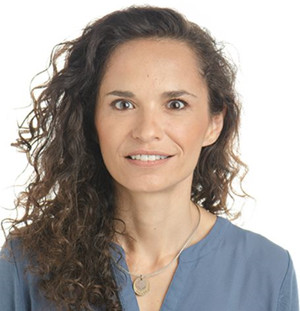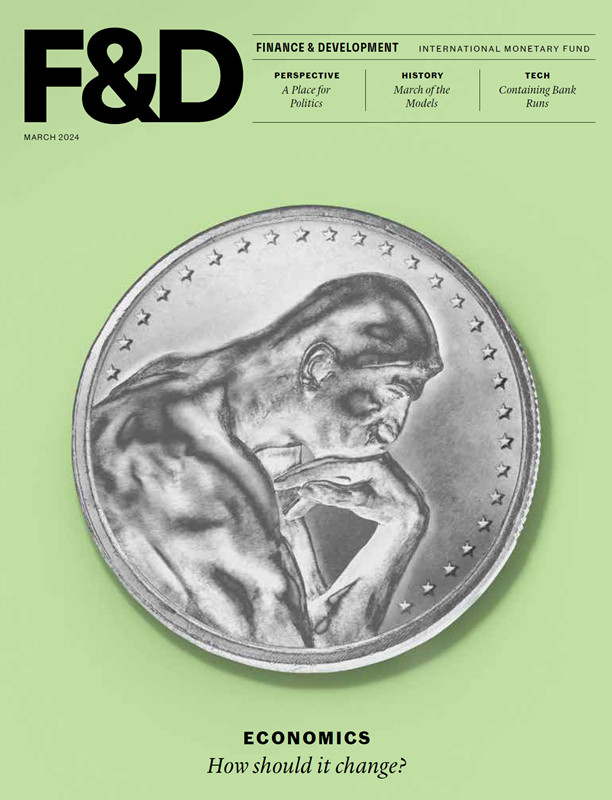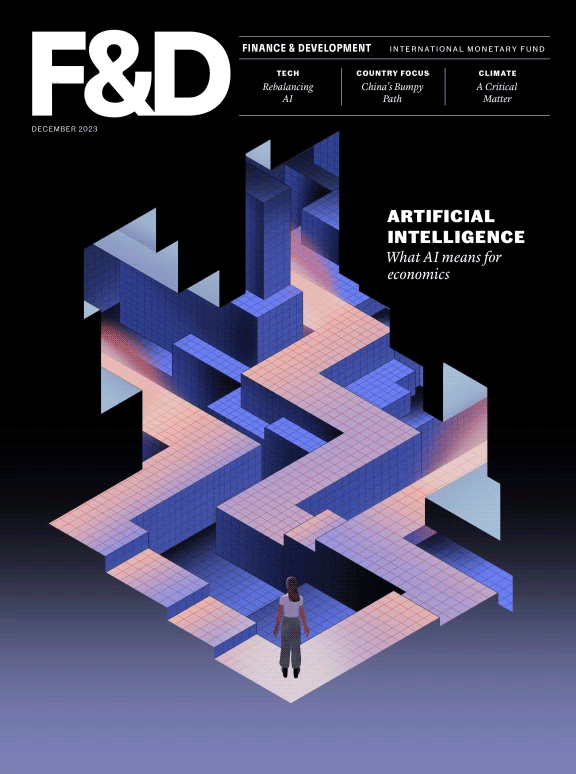Marjorie Henriquez profiles Harvard’s Stefanie Stantcheva, who uses surveys and experiments to uncover the invisible in traditional economic data
After studying taxation for several years, Stefanie Stantcheva came to a daunting conclusion: people have complex and deep-rooted views that are hard for economists to understand. When crafting policy advice with a social objective in mind, like reducing inequality, economists don’t have enough data to guide them on what people know, believe, and consider to be fair, she found.
Stantcheva, an economics professor at Harvard University, wants to change that. “The goal is really to get into people’s minds and try to understand how they reason, what their perceptions are, their attitudes, their knowledge on various economic policy issues,” she says.
Using large-scale social economic surveys and experiments, often in several countries, she has been able to get a glimpse into why people support some policies and not others, on issues ranging from redistribution to trade to environmental taxes.
“These surveys uncover what is invisible in traditional economic data and bring economics closer to other social sciences such as psychology, sociology, and political science,” says Emmanuel Saez, director of the Center for Equitable Growth at the University of California, Berkeley, and coauthor of the Paris School of Economics’ World Inequality Report. “This line of work could be a game changer for the economic profession as it will force a reevaluation of the most standard assumptions about rational economic behavior.”
Since earning her PhD from the Massachusetts Institute of Technology (MIT) in 2014, Stantcheva, 36, has become one of the world’s leading young economists. Among a boatload of awards and honors, she won the 2020 American Economic Association’s Elaine Bennett Research Prize, which recognizes outstanding research by a woman within the first seven years of receiving her PhD. She was the first woman to join the editorial board of the influential Quarterly Journal of Economics.
Early in her doctoral program, Stantcheva stood out for being drawn to questions at the center of economic research and public policy discussion. “Stefanie is fearless in the questions she asks,” says James Poterba, her doctoral advisor at MIT. “From her first year in graduate school, it was clear that she was thinking about the unanswered questions, the topics for future research, as much as the well-resolved ones.”
Stantcheva has also made important contributions to research on optimal taxation theory, a subject economists have studied for close to 100 years with much yet to learn. The field examines how to design taxes that maximize social welfare by reflecting society’s choices between equality and efficiency.
Taxation as a powerful tool
Stantcheva was 11 years old in 1997 when inflation in her birth country of Bulgaria surpassed 2,000 percent on an annual basis. Although she and her family had already left the country, the episode helped shape her eventual decision to study economics.
By the time she started undergraduate studies at the University of Cambridge, Stantcheva had already lived in East Germany, witnessing pay disparities with the West, and in France, where she was troubled by the level of inequality.
“Having lived in such different countries as a child made me witness a lot of very different economic and social systems,” she says. “When I understood that there was a field called economics that deals with these things I was interested in, it was clear that I wanted to study that.”
After Cambridge, she returned to France, where she studied master’s level economics and finance at the École Polytechnique, ENSAE, and the Paris School of Economics. When she began thinking about a doctorate, she focused on taxation to help address the inequalities she had seen growing up.
“I realized that taxation is a super powerful tool that governments have and that can be applied to many different areas,” Stantcheva says. “There is so much that actually relies on taxation. It is extremely potent in that it can have a lot of cascading effects, which could be very good or could be terrible if you get it wrong.”
One focus is the effects of taxes on various activities, with an emphasis on those that take place over long periods. Her 2017 study, “Optimal Taxation and Human Capital Policies over the Life Cycle,” broke new ground by analyzing in unprecedented detail how tax and human capital policies, such as investment in higher education, interact over a person’s life span.
She was interested in addressing the widespread problem of high student debt. Is there a system where people can pay for higher education—not just once but over a lifetime—without going into debt and exacerbating inequality? Stantcheva found that income-contingent loans can provide such a solution.
“It’s thinking jointly about the whole system—financing education and then taxing the income
generated throughout life in a way that balances the decision to acquire human capital against the disincentives that taxes create,” she says.
Under this system, a person would take out a government loan for education. As individuals earn more as a result, they pay a higher share of their incomes through taxes, which flow into the government’s common pool for education. Conversely, when people are down on their luck and their income takes a hit, they pay less.
Although nine or so countries, including Australia, New Zealand, and the UK, have adopted some form of income-contingent loans, they protect the borrower during bad times but fail to collect more during good times. For the common pool to remain funded and be truly optimal, Stantcheva found, it must work both ways.
The Social Economics Lab
“As I was studying these issues of taxation, it became very clear that something that is often missing—but that is really critical—is how people think about tax and other policies,” Stantcheva says. “Ultimately, what they consider to be the right social objective, what they consider to be fair.”
This led Stantcheva to create the Social Economics Lab at Harvard in 2018, where she and a team of about 20 research fellows, including graduate and undergraduate students, are uncovering these invisible data through rigorous large-scale surveys and experiments, the results of which in some cases debunk standard theory.
The median-voter theory, for example, predicts that wider inequality should lead to increased demand for redistribution from high-income to low-income earners as policymakers cater to the median voter. Data collected by the lab, however, suggest that the existence of inequality alone doesn’t really lead people to support redistribution. Instead, perceptions are what shape their backing for most policies.
Stantcheva, along with Harvard colleagues Alberto Alesina and Armando Miano, set out in 2018 to find out whether and how perceptions about immigration affect support for redistribution policies. They focused on two key considerations: who people think benefits from redistribution—in this case, is it immigrants?—and to what extent people think that is fair.
They surveyed 22,000 people in six countries—France, Germany, Italy, Sweden, the UK, and the US—and found large gaps between reality and perceptions. In all countries, respondents greatly overestimated the number of immigrants. They also perceived immigrants to be economically weaker, more unemployed, and less educated than they really were. This, in turn, led survey participants to say they thought immigrants paid less in taxes and received a much larger share of government transfers than was actually the case.
“These misperceptions are largest among people with lower education, in lower-paid jobs, working in sectors that employ many immigrants,” she says. “And, across all countries, among people on the right of the political spectrum.”
Just making people think about immigration before asking them about redistribution policies, they found, makes them less likely to support redistribution. “The two biggest predictors of reduced support for redistribution are the perception that immigrants ‘free-ride’ and do not put in hard work, and the perception that immigrants are economically weak,” Stantcheva says.
Through her research in other areas, she has discovered that facts and explanations of how a policy works are often effective in helping people understand it and sometimes come to support it more. However, giving people facts about immigrants, such as their numbers or origins, doesn’t shift views on redistribution, Stantcheva found. Narratives, on the other hand, do.
“One of the most effective ways to counter people’s misperceptions of immigrants is to actually tell them a story about a very hard-working immigrant that counters the free-rider narrative,” she says.
Notion of fairness
While economists have traditionally relied on arguments about economic efficiency to garner support for redistribution policies, Stantcheva has found that what appears to really matter to people is who the winners and losers are.
“Everybody cares about fairness, but it means different things to different people,” she says. Someone on the left who is less tolerant of income inequality, for instance, might think it only fair that a high earner share his or her income through higher taxes, she says, and someone on the right is more likely to consider that unfair.
Such notions of fairness are more likely to shape people’s views than arguments about efficiency, her studies show. In the case of immigration and redistribution, people who think that immigrants are not hard workers and are free-riding are also likely to expect that immigrants will unfairly benefit from redistribution.
Stantcheva reports seeing similar results in a current project, a study of attitudes concerning climate change across 20 countries. Survey data from the project already show that people’s views are shaped by who they think will bear the burden of paying for climate change.
“People think it’s unfair that the lower- or middle-income class bears a disproportionate burden through environmental taxes or other sacrifices, when they have the perception that higher-income people don’t bear as much of the burden,” Stantcheva says.
At the onset of the COVID-19 pandemic, French President Emmanuel Macron tapped Stantcheva, who is a member of the French Council of Economic Analysis, to join an international commission to assess long-term challenges beyond the pandemic and come up with proposals. She and the Harvard Kennedy School’s Dani Rodrik, a professor of political economy, were assigned to look into the challenge of inequality.
A number of their proposals reflected what Stantcheva’s surveys in France showed about people’s perceptions. For instance, knowing that many in France blame globalization and outsourcing for the lack of jobs, they urged policymakers to pay attention to how trade policies affect local labor markets.
“Under our proposal, it would be possible—after an appropriately deliberative and broadly participatory domestic process—to restrict imports that are produced under conditions that violate labor rights abroad and threaten jobs or working conditions at home,” they said in an opinion piece published by the international media organization Project Syndicate.
Carrying on a legacy
While she devotes considerable energy to the rigors of her research and often speaks at more than one conference in a day, Stantcheva adamantly makes a top priority of teaching and of coaching graduate and undergraduate students.
“I love teaching students, seeing them grasp new concepts, have lightbulb moments, experience the world through a new lens,” she says. Her colleagues say they admire the way she interacts with and cares for students.
In the past couple of years, Stantcheva has taken on an unexpected role. In May 2020, her Harvard colleague, mentor, and Social Economics Lab collaborator Alesina died suddenly at the age of 63. The Italian-born professor was one of the world’s most influential economists and was widely considered a pioneer of modern political economy, the study of how economics and political systems are linked.
“Stefanie in a very natural way has stepped up to the role that Alberto used to have for many of us,” says Pierfrancesco Mei, a Harvard student and research fellow at the lab. “One of the most special things she has done is to keep Alberto’s legacy alive.”
Helping people make better decisions
Stantcheva is currently studying how the general property tax in the US shaped economic development in the 19th century and the impact of France’s wealth tax on tax evasion and wealth. In addition to her project on perceptions of climate policy, she will continue extending her research on how people form views on key economic policies, she says.
Stantcheva is often asked to present her findings to policymakers. They are curious and are slowly becoming aware of the power of survey methods for understanding how people think, she says. She just published a note for the French Council of Economic Analysis on French people’s attitudes about climate policies.
“The gilets jaunes crisis [the “yellow vest” protests that started in 2018 over economic unrest] has traumatized policymakers in France and elsewhere in Europe, so her research, based on very rich surveys on the acceptability of these policies, is discussed with great interest,” says Philippe Martin, professor of economics at the Paris Institute of Political Studies and chair of the French Council of Economic Analysis.
Stantcheva says she ultimately hopes her research will give economists and policymakers a greater chance to build consensus around social policies that improve people’s lives. More important, she says, she hopes that by understanding how people process information, economists will be able to provide the tools people need to make better decisions.
“Our goal is to find what explanations are useful to improve people’s understanding of core policies that really shape their daily lives,” she says.
Opinions expressed in articles and other materials are those of the authors; they do not necessarily reflect IMF policy.









